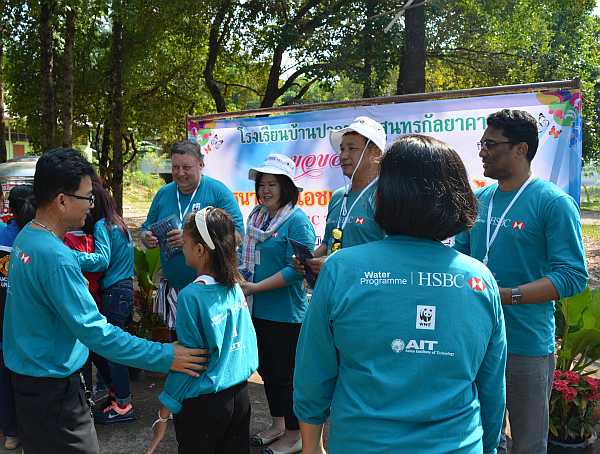The project, which is funded by HSBC, supports the conservation of the
river and wetlands of Lower Songkram River Basin, which is a crucial
resource for local communities and forms an integral part of the
ecosystem. The Lower Songkhram River Basin is home to over 170 marine
species and the source of nourishment for more than 140,000 villagers.
Part of the funds has been used to support the "River and Wetland Watch
Volunteering Programme (RWWP)", an educational program that enhances
volunteers and the local community to participate in water conservation
activities, such as upstream forest initiatives, water quality
inspection and mangrove forest restoration.
Earlier in August 2014, AIT and WWF-Thailand had received approval for
a US$ 980,000 project that will last till the end of 2016. AIT’s role
covers academic research and training, while WWF Thailand focuses on
ground level support. The Songkhram River, located in the Northeast
region of the country known as ‘Isan’, is a major tributary of the
Mekong River. The Lower Songkhram River is considered one of the
country's major rivers, as it is the last and only river unobstructed
by human made structures. It is home to about 170 marine species and is
a source of income for more than 140,000 villagers.
According to Dr Sangam Shrestha of Water Engineering and Management
(WEM) of AIT’s School of Engineering and Technology (SET), activities
included participation in the water-quality monitoring activity of the
Songkhram River, planting of mangrove forests, and presentation of a
donation which will provide water tanks, water filters and computers to
three local schools - namely Bann Pak Nam, Baan Pak Yam and Baan
Hadphaeng Schools.
Varanandha Sutthapreeda, Head of Communications, HSBC Thailand, said:
"I am delighted that HSBC is part of this important environmental
initiative. HSBC's partnership with WWF-Thailand and the AIT highlights
our commitment to sustainable and socially responsible business
practices, with focus on community development and environmental
protection. This project is a good example of partnership between the
private sector, NGOs, schools and the local communities in a bid to
protect the country's natural resources.
Yanyong Sricharoen, Manager of WWF's Community Management of Wetlands,
added: "For the riverside communities, water is part of their daily
lives. The abundance of freshwater sources directly affects each and
every one of us. The awareness of this issue and the preservation
efforts need all our attention. This is not purely an issue for just
the local communities residing by the river basins."


